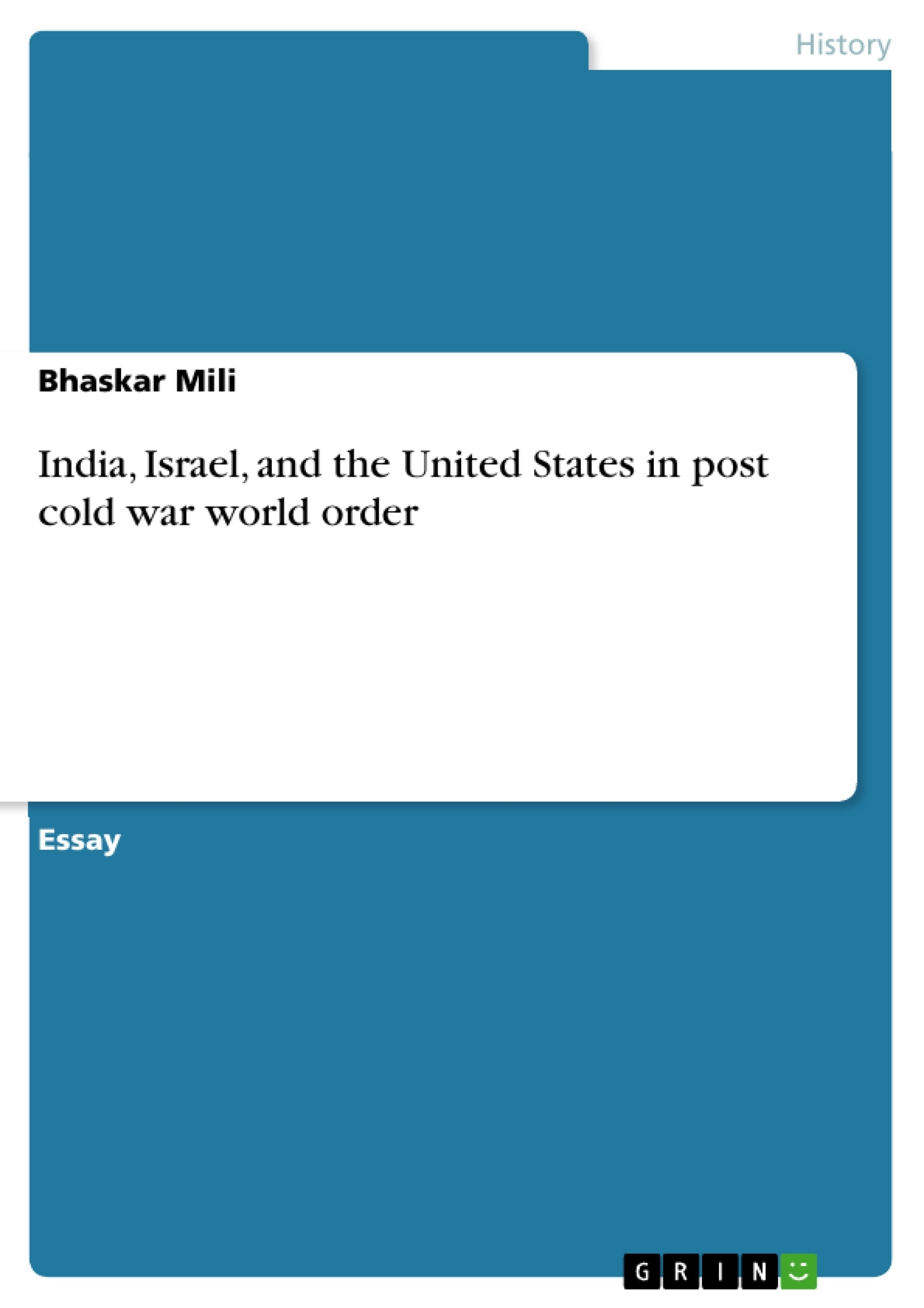The end of cold war has changed the traditional Indian foreign for to maintain safe distance from Israel as well as the United States. The foreign policy formulators in India decided to develop her relationship with the State of Israel. The relationship help India to come closer towards the US and especially after the 9/11 attack, the three countries had decided to form a strategic alliances to fight against global terrorism.
Inhaltsverzeichnis (Table of Contents)
- Introduction
- India-Israel Diplomatic Relations: A Historical Overview
- The Changing Geo-Political Scenario and India's Foreign Policy Shift
- Key Factors Influencing India's Decision
- The Establishment of Diplomatic Relations
- Arab Reactions to India's Decision
- India's Pro-Arab Policy and its Influence
- Normalization of Relations and its Implications
- The Influence of Changing Geo-Political Factors
- India's Position on the Palestine Issue
- Conclusion
Zielsetzung und Themenschwerpunkte (Objectives and Key Themes)
This work aims to provide a comprehensive analysis of the historical development of India-Israel diplomatic relations, focusing on the key factors that led to the establishment of full diplomatic relations between the two countries in 1992. The key themes explored in this study are:- The impact of the Cold War and its aftermath on India's foreign policy towards Israel.
- The role of changing geo-political realities in the Middle East and the emergence of new strategic partnerships.
- The significance of internal and external factors, including domestic political considerations, regional dynamics, and international pressures, in shaping India's decision.
- The complexities of India's relationship with the Arab world and its impact on the normalization of relations with Israel.
- The implications of the establishment of diplomatic relations for India's foreign policy and its role in the Middle East.
Zusammenfassung der Kapitel (Chapter Summaries)
- Introduction: This chapter introduces the historical background of Israel's creation and its complex relationship with the Arab world. It also outlines the challenges faced by India in establishing diplomatic relations with Israel due to its historical ties with the Arab world and its policy of non-alignment.
- India-Israel Diplomatic Relations: A Historical Overview: This chapter provides a historical overview of India's relationship with Israel, highlighting the key milestones and challenges that shaped their diplomatic relations. It explores the reasons for India's initial reluctance to establish diplomatic ties with Israel and the factors that contributed to the changing dynamics in the post-Cold War era.
- The Changing Geo-Political Scenario and India's Foreign Policy Shift: This chapter examines the changing global landscape following the end of the Cold War and the disintegration of the Soviet Union. It analyzes how these events influenced India's foreign policy priorities and its need to re-evaluate its strategic partnerships, including its relationship with Israel.
- Key Factors Influencing India's Decision: This chapter focuses on the key factors that directly influenced India's decision to establish full diplomatic relations with Israel. It discusses the role of domestic politics, regional pressures, and international considerations in shaping India's foreign policy shift towards Israel.
- The Establishment of Diplomatic Relations: This chapter details the process of establishing diplomatic relations between India and Israel, outlining the official announcement, the key individuals involved, and the diplomatic initiatives that led to the normalization of relations.
- Arab Reactions to India's Decision: This chapter explores the reactions of Arab states to India's decision to establish diplomatic relations with Israel. It examines the concerns raised by Arab countries, the diplomatic efforts undertaken by India to address their concerns, and the overall impact of the decision on India's relationships with the Arab world.
- India's Pro-Arab Policy and its Influence: This chapter analyzes the historical context of India's pro-Arab policy and its influence on its relationship with Israel. It discusses the reasons behind India's traditional support for Arab countries and the challenges it faced in balancing its relationship with both Israel and the Arab world.
- Normalization of Relations and its Implications: This chapter examines the implications of the normalization of relations between India and Israel. It discusses the areas of cooperation that have developed between the two countries, including in the fields of agriculture, water management, science and technology, and defense. It also explores the challenges and opportunities that lie ahead in strengthening the bilateral relationship.
Schlüsselwörter (Keywords)
This study focuses on the key themes of India's foreign policy, Cold War dynamics, geo-political shifts, strategic partnerships, Middle Eastern relations, diplomatic relations, and the normalization of relations between India and Israel.Frequently Asked Questions
How did India's foreign policy towards Israel change after the Cold War?
After the Cold War, India shifted from a policy of maintaining a safe distance to establishing full diplomatic relations with Israel in 1992.
What role did the 9/11 attacks play in India-Israel relations?
The 9/11 attacks led India, Israel, and the United States to form strategic alliances to fight against global terrorism.
Why was India traditionally hesitant to establish ties with Israel?
India had strong historical ties with the Arab world, a large domestic Muslim population, and a commitment to the policy of non-alignment.
How did the disintegration of the Soviet Union affect India's strategy?
The end of the bipolar world forced India to re-evaluate its strategic partnerships and seek closer ties with the US and its allies, including Israel.
In which areas do India and Israel cooperate today?
Cooperation has expanded into fields such as defense, agriculture, water management, and science and technology.
- Quote paper
- Bhaskar Mili (Author), 2014, India, Israel, and the United States in post cold war world order, Munich, GRIN Verlag, https://www.grin.com/document/279019



